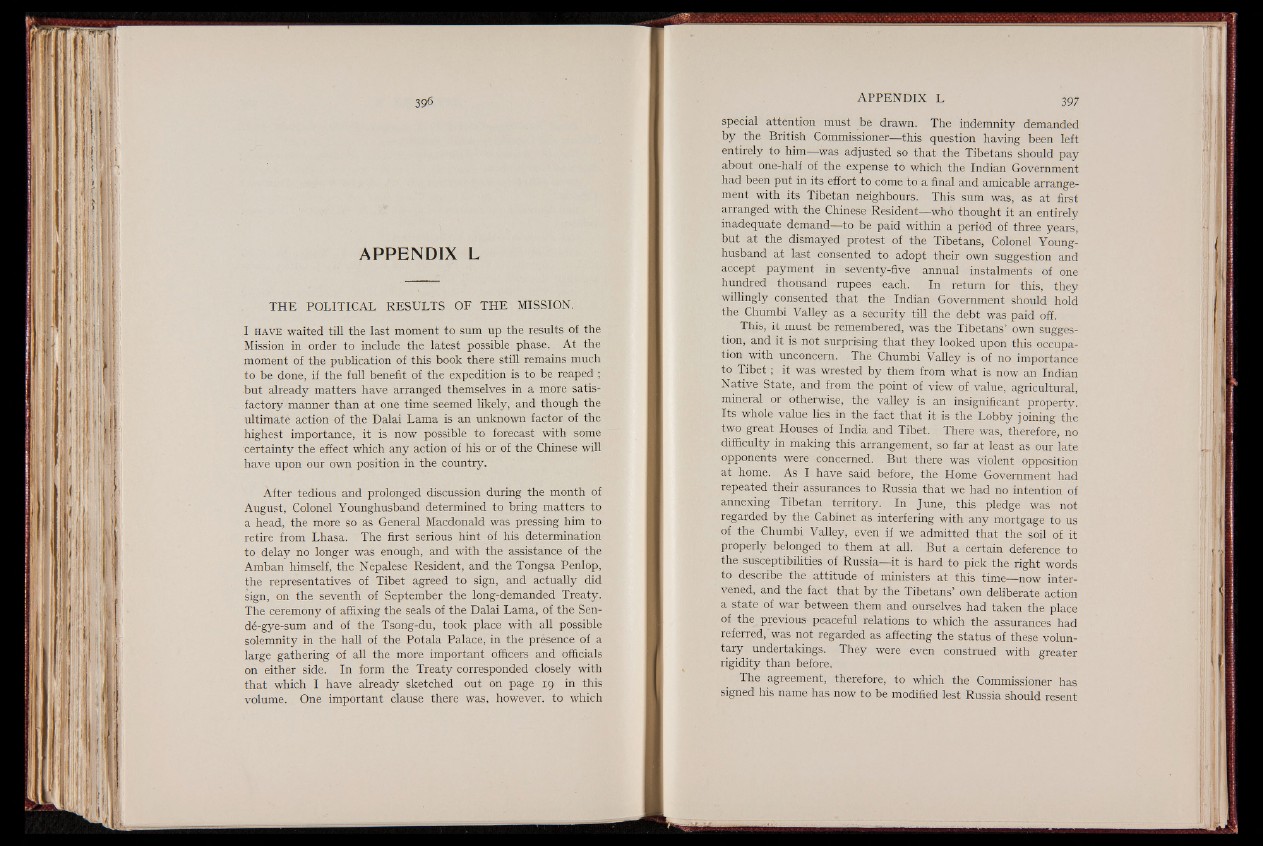
APPENDIX L
THE POLITICAL RESULTS OF THE MISSION.
I h a v e waited till the last moment to sum up the results of the
Mission in order to include the latest possible phase. At the
moment of the publication of this book there still remains much
to be done, if the full benefit of the expedition is to be reaped ;
but already matters have arranged themselves in a more satisfactory
manner than at one time seemed likely, and though the
ultimate action of the Dalai Lama is an unknown factor of the
highest importance, it is now possible to forecast with some
certainty the effect which any action of his or of the Chinese will
have upon our own position in the country.
After tedious and prolonged discussion during the month of
August, Colonel Younghusband determined to bring matters to
a head, the more so as General Macdonald was pressing him to
retire from Lhasa. The first serious hint of his determination
to delay no longer was enough, and with the assistance of the
Amban himself, the Nepalese Resident, and the Tongsa Penlop,
the representatives of Tibet agreed to sign, and actually did
sign, on the seventh of September the long-demanded Treaty.
The ceremony of affixing the seals of the Dalai Lama, of the Sen-
dé-gye-sum and of the Tsong-du, took place with all possible
solemnity in the hall of the Potala Palace, in the présence of a
large gathering of all the more important officers and officials
on either side. In form the Treaty corresponded closely with
that which I have already sketched out on page 19 in this
volume. One important clause there was, however, to which
special attention must be drawn. The indemnity demanded
by the British Commissioner— this question having been left
entirely to him— was adjusted so that the Tibetans should pay
about one-half of the expense to which the Indian Government
had been put in its effort to come to a final and amicable arrangement
with its Tibetan neighbours. This sum was, as at first
arranged with the Chinese Resident— who thought it an entirely
inadequate demand— to be paid within a period of three years,
but at the dismayed protest of the Tibetans, Colonel Younghusband
at last consented to adopt their own suggestion and
accept payment in seventy-five annual instalments of one
hundred thousand rupees each. In return for this, they
willingly consented that the Indian Government should hold
the Chumbi Valley as a security till the debt was paid off.
This, it must be remembered, was the Tibetans’ own suggestion,
and it is not surprising that they looked upon this occupation
with unconcern. The Chumbi Valley is of no importance
to T ib e t; it was wrested by them from what is now an Indian
Native State, and from the point of view of value, agricultural,
mineral or otherwise, the valley is an insignificant property.
Its whole value lies in the fact that it is the Lobby joining the
two great Houses of India and Tibet. There was, therefore, no
difficulty in making this arrangement, so far at least as our late
opponents were concerned. But there was violent opposition
at home. As I have said before, the Home Government had
repeated their assurances to Russia that we had no intention of
annexing Tibetan territory. In June, this pledge was not
regarded by the Cabinet as interfering with any mortgage to us
of the Chumbi Valley, even if we admitted that the soil of it
properly belonged to them at all. But a certain deference to
the susceptibilities of Russia— it is hard to pick the right words
to describe the attitude of ministers at this time— now intervened,
and the fact that by the Tibetans’ own deliberate action
a state of war between them and ourselves had taken the place
of the previous- peaceful relations to which the assurances had
referred, was not regarded as affecting the status of these voluntary
undertakings. They were even construed with greater
rigidity than before.
The agreement, therefore, to which the Commissioner has
signed his name has now to be modified lest Russia should resent